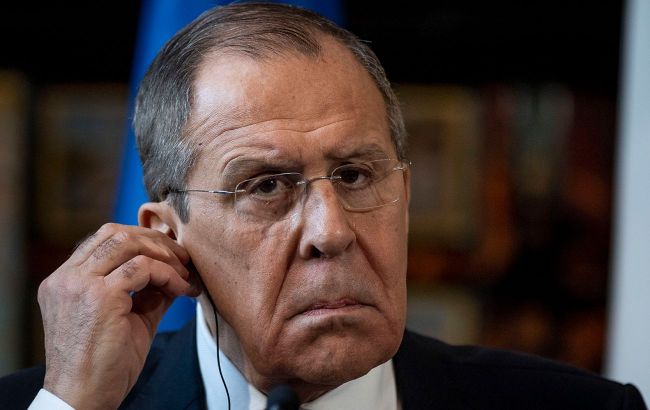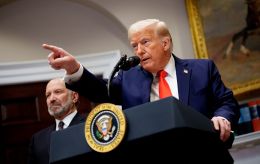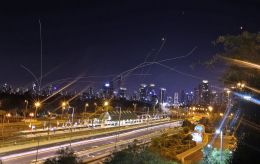Lavrov's boycott and support for Ukraine: Highlights of OSCE Ministerial Council meeting
 Russian Foreign Minister Sergey Lavrov (Getty Images)
Russian Foreign Minister Sergey Lavrov (Getty Images)
The first day of the meeting of the OSCE (Organization for Security and Co-operation in Europe) Ministerial Council took place in the capital of North Macedonia, Skopje. It was marked by the boycott of the Russian Foreign Minister Sergey Lavrov, his ask to "leave him alone", and assurances of European partners in support of Ukraine.
To prepare the article, the following sources were used: statements from European officials, Russian Foreign Minister Sergey Lavrov, advisor to the head of the Office of the President of Ukraine Mykhailo Podolyak, and EU delegation to the OSCE.
Russian Minister Sergey Lavrov arrived in Skopje the evening before. The flight turned out to be longer than expected. Earlier, Bulgaria granted permission for the flight through its airspace but demanded that Maria Zakharova, an official representative of the Russian Ministry of Foreign Affairs under sanctions, not be on board. The exception for Lavrov did not apply to other members of the delegation.
As a result, they had to fly through Greece. As it turned out, the main adventures awaited the Russian minister at the OSCE meeting.
Boycott extended beyond Ukraine and the Baltic countries
The boycott of the ministerial meeting over Lavrov's presence was announced in advance by the foreign ministers of Ukraine, Lithuania, Latvia, and Estonia.
For more details on the reasons, read the story 'Lavrov's place is at a special tribunal'. Key points on OSCE meeting and Ukraine's diplomatic standoff.
The day before, the foreign minister of Poland, Jacek Czaputowicz, joined the boycott of his Ukrainian and Baltic colleagues.
"The fact that the Minister of Foreign Affairs of Russia, on an equal footing with other partners, participating in a meeting of an organization that is supposed to build peace and security in Europe, being at the same time the Minister of Foreign Affairs of a country that is an aggressor, responsible for war crimes in Ukraine, is unacceptable for us," he notes.
However, in Europe, some are pleased with Lavrov's invitation. The head of the Austrian Ministry of Foreign Affairs, Alexander Schallenberg, welcomed North Macedonia's decision. Last year, he was the only head of a foreign affairs department who criticized the OSCE Council of Ministers in Poland without Lavrov's participation.
"As the West, we should not be afraid to sit at the negotiating table with the Russians. I believe that the tendency to immerse ourselves in our foreign policy echo chambers is life-dangerous," explained Schallenberg his position.
The Prime Minister of North Macedonia, Dimitar Kovacevski, calls the arrival of the Kremlin representative a victory. But it is a victory not for Russia but for the OSCE given the questioning of the organization's viability.
"We need to realize that each country sends its message about unjustified aggression that the Russian Federation has committed against a sovereign state - Ukraine," he commented on the boycott of other countries.
The boycott was supported by the head of European diplomacy, Josep Borrell. The EU delegation was represented at the ministerial meeting, but instead of him, the Deputy Head of the EU delegation, Rasa Ostaruskaite, spoke. Among other things, she condemned Russia and Belarus for aggression against Ukraine.
U.S. Secretary of State Antony Blinken arrived in Skopje but stayed at the summit for a short time, leaving before Lavrov arrived there.
Lavrov promotes Russian narratives and asks to leave him alone
As soon as Sergey Lavrov took the floor at the OSCE Council of Ministers, representatives of Ukraine left the meeting, joined by delegations from several other countries. They did not want to hear once again how Lavrov promotes Russian narratives. The Russian Foreign Minister complained that Western political elites "appropriated the right of humanity's fate deciders and made a choice not in favor of the OSCE but in favor of NATO."
He also mentioned the promise made at the Bucharest summit that Ukraine and Georgia would join the Alliance in the future to "direct them against Russia," the Maidan events in 2014, the Minsk agreements, and the refusal of the US and NATO in 2021 to legally secure security guarantees (which implied Ukraine not joining the Alliance). The standard set of narratives was completed by statements about alleged rampant neo-Nazism.
Danish Foreign Minister Lars Løkke Rasmussen called his words deceitful and emphasized that Western leaders would not agree to Russia's attempt to divide Europe into spheres of influence. He also notes that Moscow's actions violate international order, and attempts to shift blame onto others are evident to the naked eye.
Lavrov delivered his speech in Russian. When he said, "One of the key components of this line has become the uncontrolled expansion of NATO to the east, which began after the dissolution of the Warsaw Pact," he paused and, looking sideways, said in English:
"Can you leave me alone, please? Thank you." It is unclear whom Lavrov was addressing specifically, but presumably, someone off-camera was trying to distract him.
After his speech, he immediately left the session. Earlier this week Moscow spoke of great interest in organizing bilateral meetings, but Lavrov only had a short conversation with Armenian Minister Ararat Mirzoyan and predictably with his Hungarian counterpart Peter Szijjarto. According to the Russian Ministry of Foreign Affairs, they also discussed the situation in Ukraine.
Ukrainian reaction to Lavrov's speech
With Lavrov's presence at the OSCE Council, the Russian side continues to disregard international law and attempts to spoil the reputation of international institutions, as stated by the advisor to the head of the Office of the President of Ukraine, Mykhailo Podolyak.
"The representative of Russia in Skopje at the OSCE meeting directly told the world that war is a good tool of foreign policy, that mass murderers have the right to commit war crimes, that the war in Ukraine needs to be continued and escalate so that those who use violence and genocidal military practices as the only arguments of their foreign policy need to be involved in a discussion on the principles of mutual security," he wrote.
As a way out of the situation, he proposes:
- the total political isolation of Russia;
- suspension of its membership in international organizations;
- final refusal to provide an international platform for Russian propaganda.
EU condemns Russia's aggression, the Netherlands promises assistance to Ukraine
On the first day of the European ministers' summit, the EU delegation to the OSCE published a statement condemning Russian aggression. The statement was supported by over 30 countries, including North Macedonia, Montenegro, Albania, Moldova, Bosnia and Herzegovina, Georgia, Iceland, San Marino, and Ukraine.
"We once again call on Russia to immediately cease its aggressive war against Ukraine and fully and unconditionally withdraw all its forces and military equipment from the entire territory of Ukraine within its internationally recognized borders," the document said.
Partners note that Europe's security depends on Ukraine's security, so the EU will continue to provide support. The EU has already mobilized 85 billion euros in financial, economic, humanitarian, and military aid, and in the long term, will contribute to fulfilling further commitments.
"We will support the recovery and reconstruction of Ukraine in coordination with international partners, including the demining process," the EU added.
Additionally, the EU will continue diplomatic efforts to ensure broad support for the Ukrainian Peace Formula and prepare for the Global Summit.
At the end of the first day of the summit, the Dutch Minister of Foreign Affairs, Hanke Bruins Slot, announced plans to provide additional assistance of 2.5 billion euros to Ukraine.
"The Netherlands will continue to support Ukraine as much as needed and how needed," she said.
Earlier, the Dutch Minister of Defense, Kajsa Ollongren, mentioned that these funds would help meet Ukraine's needs for ammunition and support already delivered systems.

